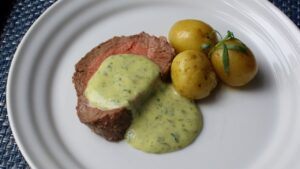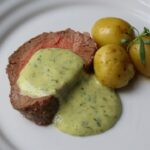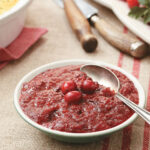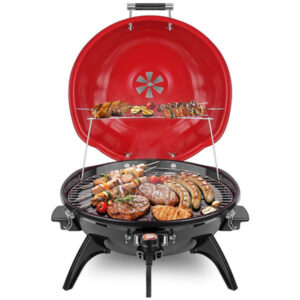Very few culinary experiences can compare to biting into tender, juicy spareribs, drenched in sauce, as flavors dance on your taste buds. While most find it hard to resist traditional barbecue sauces for spare spareribs, have you ever considered trying something new? How about a white curry barbecue sauce, built upon the classic white sauce base but infused with curry and coconut milk?
In this article, we’ll delve deep into the origins, ingredients, and secrets behind this delightful fusion. Get ready to explore the art of balancing flavors, crafting your own sauce, and unlocking the full potential of this sauce beyond just spareribs.
Why Use White Curry Barbecue Sauce on Spareribs?
Many may wonder how the mild-mannered white sauce pairs with the robust flavors of barbecue. Fear not, for we’ll introduce a special secret ingredient to the classic white sauce. The result is a white curry barbecue sauce that complements spare spareribs perfectly. The succulent, smoky essence of the spareribs harmoniously blends with the creamy notes and spices of the sauce.
The Origin of White Curry Barbecue Sauce
White curry barbecue sauce originates from the southern United States, where it’s a fusion of Southern barbecue and Indian curry flavors.
The Southern United States provides an ideal environment for barbecue culture, with its warm climate and thriving livestock industry. On the other hand, the region is culturally diverse, with a significant Indian population. The aromatic and complex flavors of Indian curry captured the hearts of Southerners. Additionally, the South has a history of incorporating coconut and coconut-based ingredients into various dishes, such as coconut rice, coconut soup, and toasted coconut, possibly influenced by Caribbean and Southeast Asian cuisines. Creative Southern cooks decided to experiment by adding curry and coconut milk to the traditional white sauce.
So, how do these ingredients work together to achieve a balanced and layered flavor in white curry barbecue sauce? Let’s break down each component.
The Key Ingredients of White Curry Barbecue Sauce
Let’s take a closer look at the star players in this culinary show:
- 250ml White Sauce
- 2 tablespoons Curry Powder
- 125ml Coconut Milk
- 1 teaspoon Olive Oil
- Salt and Pepper, to taste
How do these ingredients collaborate to create a harmonious yet complex flavor profile in white curry barbecue sauce? Allow me to introduce each ingredient.
White Sauce: The Creamy Canvas
White sauce is a classic sauce, similar to France’s Béchamel Sauce, typically made from a mixture of butter, flour, and milk. It provides a mild base for this barbecue sauce, acting like a neutral canvas upon which other ingredients can shine.
Making White Sauce

Ingredients:
- 50 grams of butter (about 3.5 tablespoons)
- 50 grams of flour (about 1/3 cup)
- 500 milliliters of milk (about 2 cups)
- Salt and pepper (to taste)
- A dash of tarragon (Nordic-style)
Instructions:
- Melt the Butter: In a medium-sized saucepan, melt the butter over medium heat, being careful not to let it brown.
- Add the Flour: Once the butter is melted, add the flour and gently whisk or stir with a wooden spoon to combine the flour evenly with the butter. Continue to cook, stirring, until the flour becomes a pale, but not browned, paste, usually about 2-3 minutes.
- Add the Milk: Gradually pour in the milk, whisking constantly to avoid lumps. Continue to simmer and stir until the sauce thickens, typically about 5 minutes.
- Season: Once the sauce reaches the desired thickness, season it with salt and pepper to taste. A touch of tarragon adds a refreshing twist.
Curry Powder: The Aromatic Alchemist
The soul of this white curry barbecue sauce is the curry powder, a blend of spices such as coriander, cumin, and turmeric. Curry powder is a culinary marvel, combining multiple, even dozens, of spices into one mixture that quickly releases its fragrant bouquet when heated. It infuses the sauce with an irresistible depth of flavor and a subtle hint of spiciness.
Coconut Milk: Tropical Essence
Coconut milk is typically extracted from coconut flesh, the primary edible part of coconuts, known for its natural sweetness. Moreover, coconut flesh is rich in fats, imparting a nutty flavor and a creamy texture to coconut milk. Additionally, as coconut milk is an organic compound and the aromas and flavors of curry spices are primarily organic in nature, when curry powder encounters coconut milk, organic compounds merge more rapidly, enhancing the aroma of the curry. Its sweetness and nuttiness seamlessly intertwine with the spiciness of curry, creating a tropical symphony in your mouth.
Olive Oil: Silky Lubricant
Olive oil carries a distinct aroma that imparts a silky texture and a subtle fruity note to the white curry sauce. However, it’s crucial to add olive oil last, as the fresh fruity notes can be lost if exposed to high heat during cooking.
Salt and Pepper: Flavor Enhancers
These simple yet essential ingredients elevate the complexity of the sauce, enhancing each flavor component.
Creating white curry barbecue sauce is like conducting a delicious symphony. Balancing the creaminess, spiciness, and sweetness is key. Start with white sauce as the canvas, gradually add curry powder, adjust sweetness with coconut milk, and finally, enhance the overall texture with olive oil.
Making White Curry Barbecue Sauce from Scratch
Making white curry barbecue sauce at home is remarkably simple. Just follow these steps to create your own delightful sauce:
- If you’re using store-bought white sauce or pre-made white sauce, heat it up; curry powder releases its aroma best at higher temperatures.
- Gradually add the curry powder while stirring continuously, ensuring even distribution within the white sauce.
- While stirring, slowly incorporate the coconut milk until the sauce becomes smooth and reaches your desired thickness.
- Turn off the heat, season with salt and black pepper to taste.
- Add the olive oil, stir well, and don’t hesitate to brush it onto your spareribs immediately!
There you have it – your homemade sauce.
Depending on your taste preferences and dietary restrictions, there are exciting variations to explore with white curry barbecue sauce:
- Mild to Spicy: Adjust the amount of curry powder to control the level of spiciness.
- Fruity or Creamy: Adjust the quantity of coconut milk.
- Silky Smoothness: Modify the amount of olive oil based on your preference. If you dislike the aroma of olive oil, consider using coconut oil, grapeseed oil, or others.
Pairing White Curry Sauce-Barbecued spareribs with Wine
When choosing wines to pair with your white curry barbecue sauce-barbecued spareribs, consider both flavor fusion and complementary elements for a delightful dining experience. Here are two wine pairing suggestions:
White Wine: If you enjoy a fresh and balanced palate, dry white wine is an excellent choice. Its acidity complements the cheese and coconut milk flavors in the white curry barbecue sauce. The wine’s citrus and stone fruit notes harmonize with the spices in the curry, creating a fresh and balanced taste.
Sparkling Wine: Sparkling wine’s lively bubbles and fruity notes provide a contrast to the smoky and curry flavors of the spareribs. This contrast creates an enjoyable gustatory experience, adding a special and celebratory touch to your meal.
Culinary Adventures Beyond spareribs

When it comes to white curry barbecue sauce, don’t limit yourself to spareribs. This versatile condiment can elevate the flavors of various dishes:
- Grill chicken, seafood, or vegetables, then brush with the sauce for mouthwatering results.
- Use it as a dipping sauce for spring rolls or chicken tenders.
- Drizzle it on sandwiches, wraps, or salads to infuse an exotic flair.
Experiment with fusion dishes like white curry barbecue pizza or fried corn cakes.
Frequently Asked Questions
Q1: Is white curry barbecue sauce suitable for vegetarians?
Yes, by using plant-based butter and coconut cream instead of traditional dairy ingredients, white curry barbecue sauce can easily accommodate vegetarians.
Q2: How long can homemade white curry barbecue sauce be stored?
Homemade white curry barbecue sauce can be stored in a sealed container in the refrigerator for up to two weeks. Be sure to stir it well before each use.
Q3: Can I freeze white curry barbecue sauce for later use?
Yes, you can freeze white curry barbecue sauce in a sealed container for up to three months. Thaw it in the refrigerator and stir thoroughly before using.
























